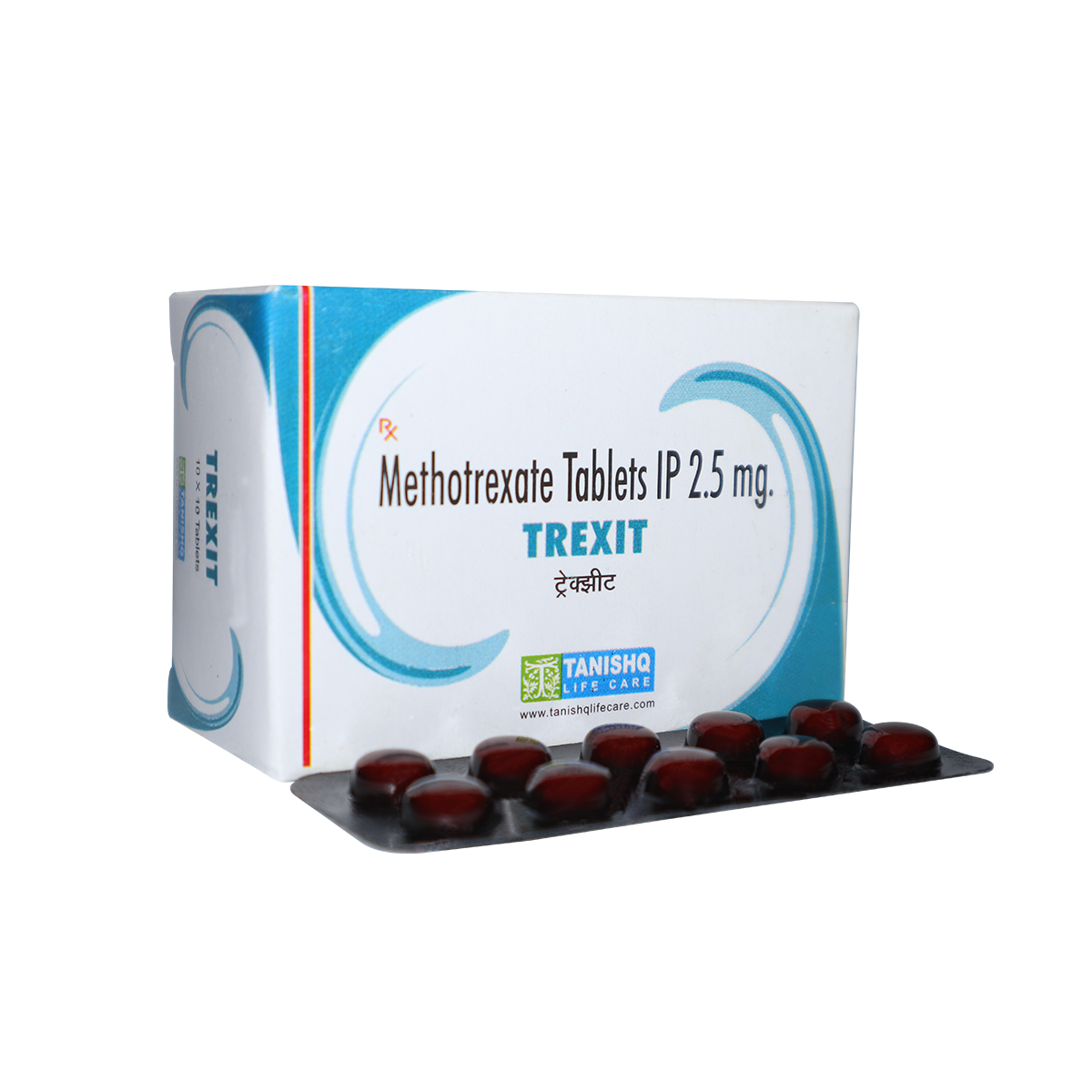
Trexit
Methotrexate is an immunosuppressive and antimetabolite drug. It works by interfering with the growth of certain cells in the body, especially those involved in inflammation and the immune system. It is commonly used to treat autoimmune diseases and some types of cancer. Methotrexate can be taken orally in tablet form, such as the 2.5mg tablet, or administered via injection.
- Recommended Usage
Indications
Methotrexate 2.5mg tablets are typically used for:
- Rheumatoid Arthritis (RA): It is used in the treatment of moderate to severe rheumatoid arthritis, especially in patients who have not responded to other therapies.
- Psoriasis: Used for moderate to severe chronic plaque psoriasis that is resistant to topical treatments.
- Crohn’s Disease: In some cases, methotrexate is prescribed for the treatment of Crohn’s disease when other medications have not been effective.
- Certain Cancers: Methotrexate is also used to treat certain cancers, including leukemia, breast cancer, and others.
- Other Autoimmune Conditions: Can be used for conditions like systemic lupus erythematosus (SLE) and vasculitis under appropriate medical guidance.
Dosage and Administration
Rheumatoid Arthritis:
• Typically, the starting dose is 7.5 mg once weekly, which may be gradually increased up to 20-25 mg per week depending on the patient’s response.
• The 2.5mg tablet is often taken multiple times a week to reach the prescribed dose.
Psoriasis:
• Similar to RA, methotrexate is taken in weekly doses, starting with 10-25 mg/week and adjusted according to clinical response.
Cancer:
• Dosing varies depending on the type of cancer and is typically higher than the doses for autoimmune diseases.
Precautions
Liver Function: Methotrexate can cause liver toxicity. Regular liver function tests are necessary, and methotrexate should be avoided in patients with significant liver disease.
Bone Marrow Suppression: Methotrexate can suppress bone marrow function, leading to low blood cell counts (anemia, neutropenia, and thrombocytopenia). Blood counts should be monitored regularly.
Kidney Function: It may affect kidney function, so kidney function should be monitored in patients on long-term methotrexate therapy.
Pregnancy and Breastfeeding: Methotrexate is contraindicated during pregnancy and breastfeeding, as it may cause harm to the fetus or infant. Contraception should be used during therapy.
Infections: Methotrexate suppresses the immune system, making patients more susceptible to infections. Live vaccines should be avoided during treatment.
Gastrointestinal Issues: Methotrexate can cause nausea, vomiting, and gastrointestinal discomfort. Taking the medication with food can help reduce some of these side effects.
Alcohol Consumption: Alcohol consumption should be limited or avoided, as it increases the risk of liver damage.
Other Drugs: Methotrexate interacts with various medications. It is crucial to inform the healthcare provider about any other medications being taken.
Product Category
- Anti Infective
- Injectables
- Pre Filled Syringe
- Immunosuppressants
- Anti Ulcerant/ppis
- Joint Care
- Enzymes
- Heamatinic Agents
- Antioxidant Multivitamins
- Laxatives
- Anti Alergic
- Corticosteroids & Combinations
- Anti Fungal
- Medicated Soaps
- Emollients and Moisturisers
- Face Care
- Puva & Sun Protectors
- Hair Care
- Anti Acne Preparation
- Analgesics Antipyretics & Anti Inflammatory
- Anti Spasmodic & Anti Emetic
- Expectorants Antitussives & Mucolytics
- Antidiarrheals
- Cardiac Drugs
- Antipsychotics
- Anti Epileptics
- Migraine
- Anti Dyspetic
